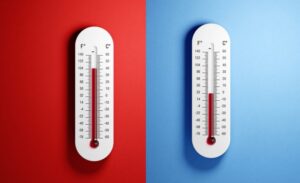 If you have a heat pump to warm and cool your home, or you have given serious thought to having one installed to replace your cooling and heating in West Chester, OH, then you’re likely aware that heat pumps can struggle in extreme cold weather. When a heat pump operates in heating mode, it moves heat from the outdoors to the indoors. Although there’s always some heat outdoors, no matter how cold it is, a heat pump can begin to lose energy efficiency when the temperatures fall too far.
If you have a heat pump to warm and cool your home, or you have given serious thought to having one installed to replace your cooling and heating in West Chester, OH, then you’re likely aware that heat pumps can struggle in extreme cold weather. When a heat pump operates in heating mode, it moves heat from the outdoors to the indoors. Although there’s always some heat outdoors, no matter how cold it is, a heat pump can begin to lose energy efficiency when the temperatures fall too far.
Is this something you need to worry about with your heat pump? At what temperature will your heat pump begin losing its efficiency?
Heat pumps can still heat your home, even when it’s cold
We want to start by reassuring you that your heat pump can handle most cold weather without trouble. The current technology of heat pumps allows them to deal with lower temperatures than ever before.
The way a heat pump draws heat from the outdoor air is by pulling the air across a refrigerant coil that contains cold liquid refrigerant. A heat pump won’t encounter any trouble if the temperature of the air is above freezing. When the temperature goes below freezing, the heat pump will not work at as high an efficiency. This point is called the economic balance point, and it shifts depending on humidity levels.
Here’s an important fact to remember: even if your heat pump is working at lower efficiency, you will still receive the heating you need indoors. The heat pump is still drawing in the same levels of heat, but it must expend more electrical power to access it.
Options to help a heat pump in the extreme cold
When temperatures outside fall below 25°F, the efficiency decline for a heat pump can be steep. However, there are options to help with heating your home when this occurs. There is supplemental heat, which is electrical heating elements that turn on to provide extra heat.
A more popular option is to install a dual fuel heat pump, also known as a hybrid heat pump. This is a type of heating system that uses a back-up furnace. The furnace only turns on when the heat pump loses efficiency below the economic balance point. The furnace can run from propane if the house doesn’t have a natural gas connection.
Although it costs more money to have the backup furnace running, it can save energy compared to trying to run the heat pump in temperatures below 25°F. The backup furnace will only run as long as necessary and then shut off.
We’ll see you have the great, affordable heating you need
Heat pumps are not right for all homes, but they can be wonderful additions to the right ones: they’re great air conditioning systems for the summer and can handle the majority of winter days without trouble. They’re especially beneficial for all-electric homes that can’t use gas furnaces, since they consume much less electricity in heating mode than an electric furnace.
If you have concerns about your heat pump’s heating power during winter, talk to our experts—we’ll see you get affordable comfort!
Call Bartels Heating & Cooling “For a Comfortable Way of Life”!
